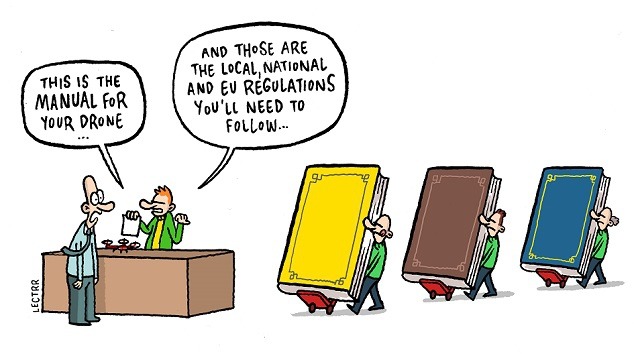Do you need to get from Brussels to Paris on Saturday? One option is to go with Julie. She has already filled two of the free seats in her car, but has one place left and it will cost you 23 euros. She looks friendly and gets good reviews from passengers. But Julie doesn’t like smoking, take pets or listen to music in the car. She does like to talk, though: she labels herself “BlaBlaBla” (chatty). Interested?
BlaBlaCar, an online car-pooling service for long-distance trips, has more than just an unusual name. It has 40 million members in over 20 countries, was valued at a cool €1.4 billion in 2015 – and it’s French. While it is dwarfed by Uber – the American ride-hailing app that competes with taxis over short distances, which is valued at $68 billion (€63 billion) – its global growth potential is huge. After a decade of sluggish growth and stagnant or declining living standards, Europe needs many more young and dynamic companies like BlaBlaCar in order to accelerate into the economic fast lane. And regulators need to help, not hinder them.
Europe is ripe for an entrepreneurial revolution. It has many well-trained designers, engineers and computer programmers – together with 500 million consumers, most of whom are glued to their smartphones. Talented and ambitious young people who are locked out of good jobs in countries with ossified labour markets have plenty to gain from starting their own company or working for a start-up. More money than ever is available from investors, often foreign, who are more willing to take a risk on young companies than Europe’s established banks.
Regrettably, big obstacles still stifle enterprise, not least outdated regulations that favour incumbent companies and traditional ways of doing things at the expense of upstarts with novel approaches. Yet, while these urgently need to be modernised and loosened, they can also provide opportunities for smart and nimble start-ups such as BlaBlaCar.
Until recently, SNCF, France’s state-owned railway company, enjoyed a monopoly on domestic transport longer than 100 kilometres. Since French trains are expensive, packed at peak times and often provide poor service, many people drive. That provides an opportunity for BlaBlaCar, which matches passengers looking for a cheap ride with drivers who have spare seats and are looking for company or someone to share their travel costs.
While a weak economy is problematic for most companies, BlaBlaCar has also been boosted by France’s stagnation in recent years. French people are more cost-conscious than ever, while the SNCF has been starved of investment during a period of austerity. And even though two years ago, economy minister (and now presidential candidate) Emmanuel Macron finally challenged SNCF’s monopoly by opening up long-distance bus travel, this doesn’t seem to have dented BlaBlaCar’s appeal.
BlaBlaCar approaches competitive and regulatory barriers very differently to Uber. The US firm has clashed with taxi drivers around Europe by directly challenging their local monopolies and run up against regulators by driving through stop signs. In contrast, BlaBlaCar works with local regulations.
Drivers are not allowed to make a profit from their passengers; they can only share their fuel, insurance, toll and tax costs. That ensures drivers aren’t treated as businesspeople and so don’t fall foul of insurance and licensing requirements. It also means drivers aren’t as threatening to established businesses such as taxis. And it keeps prices low, even at the last minute, helping to grow the business and ensuring a reputation for fair pricing. BlaBlaCar makes a profit by charging a commission once it is established in a particular market.
BlaBlaCar highlights how, even in a highly regulated economy such as France, there are opportunities for entrepreneurs who can work with, and around, the regulations. And since the transport sector is tightly regulated in many other economies around the world too, BlaBlaCar’s experience in navigating French red tape puts it in good stead in promising markets such as India. Indeed, in poorer countries, where public transport is often patchy or non-existent, the opportunities are huge.
Dodging obstacles
Regulation also provides opportunities for companies like Unifly, a Belgian start-up. Drones were a popular present last Christmas and are ever more common in city skies. Amateurs love fooling around with these remote controlled (or autonomously programmed) flying vehicles. Businesses increasingly see opportunities to use them for deliveries, to take aerial photographs, for surveying and much else. Journalists use them to chase celebrities, the police to pursue criminals. But drones, especially larger ones, may also pose safety risks to planes, buildings and people in the street. They may also be used to encroach on people’s privacy. And terrorists could even use them to deliver bombs. So European legislators are busy drafting new laws and updating old ones to cope with the proliferation of different kinds of autonomous flying machines.
This regulatory obstacle course provides an opportunity for Unifly. It has developed a software platform that tells drone pilots where it is safe and legal to fly. Its app helps professional users manage their drones, flights and operations. It also provides valuable data about drone flights to manufacturers and software providers. And it keeps regulators abreast of drone traffic, helps them manage very low level airspace and even enables them to communicate directly with drone operators.
World-beating European start-ups such as BlaBlaCar and Unify highlight how dynamic companies can prosper by making the best of Europe’s highly regulated environment. But EU authorities also need to do their best to help. BlaBlaCar has grown so fast that it is now challenging vested interests. Spanish inter-city bus companies see it as a threat. They took it to court, alleging it was competing “unfairly” and demanding that it be banned. Fortunately, in that instance the judge sided with BlaBlaCar.
Since the sharing economy is a crucial part of Europe’s (would-be) digital single market, it is vital that the European Commission stand up for success stories such as BlaBlaCar that bend over backwards to comply with local regulations. Last year, it published useful guidance on how EU law should be applied to the sharing economy. It suggests, for instance, that service providers should only be obliged to obtain business licenses where strictly necessary to meet relevant public-interest objectives.
Governments should protect consumers without imposing disproportionate obligations on private individuals who only provide services occasionally. But in the face of varying national and local approaches that make a mockery of Europe’s “single” market, the Commission may need to take a tougher approach.
The EU is also discussing how to update the framing regulation of the European Aviation Safety Agency (EASA) to incorporate drones. And the Commission is developing a “U-Space” initiative – U is for urban, apparently – to manage low-flying drone traffic. The aim is to make drones “part of European citizens’ daily lives by 2019”. To get Europe’s economy to take off, regulators need to let entrepreneurs fly.
By Philippe Legrain


